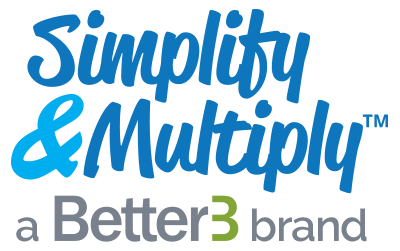101: An Introduction to the Simplify & Multiply Show
Listen to the podcast:
Juno Beach Pier, Juno Beach, Florida
This episode is about introducing the Simplify & Multiply show. The show is about why I created Simplify & Multiply and to give you a little bit of back story about my solo journey.
Read the episode transcript:
1:00 — One day I was walking along the beach on a sidewalk just on the other side of the dunes and all of the sea grapes in Palm Beach County where I live in Florida. It was a gorgeous day and the sun was just getting ready to set and it was just that time of day that everything just gets really calm and easy and just the energy of the beach is just wonderful. It's one of my favorite things to do either I'll go in the morning or I'll go in the evening, but I love to get it at the beginning or the end of the day and I find myself as I'm walking along the beach that I get really inspired by listen to either music or a good podcast or something that really kind of gets my creative juices flowing.
1:43 — I'm always looking for things that can do that for me. I happened to be listening to a podcast that was talking about creating like a title or a brand or something that's easy for people to remember like a catchphrase or something that you would use as a speaker or as you're doing a presentation to an audience that you're trying to sell an idea to, and as I was listening, and I was kind of half listening and I was trying to come up with my own catchphrase, not really a tagline, because that’s more around branding and stuff, and so I was thinking myself, What do I really do for the people that I actually have as clients and their businesses what do I actually do?
2:30 — I give them a lot of confidence and I also simplify life for them. I make things a lot easier because sometimes marketing and business development can be really complicated, especially when you’re a solopreneur. So I started thinking more along the lines of simplified, how I love the whole concept around simplifying life and being organized and making things easier on yourself. And then I started thinking well, what happens when you simplify something or make it easier on yourself? Well, you open up avenues for new opportunities, you can increase your income, you can increase your health and vitality, and so I started thinking, what’s a good word that maybe rhymes with that? Or sounds similar to that?
3:11 — That’s kind of where I came up with Simplify & Multiply. When it first popped into my head—I don't know if it was an inspired idea that was given to me from above if you know what I mean or if it was something that actually you know I just noodled through as I was listening to that podcast—but either way I just fell in love with it instantly because I could really get a sense of what that could mean potentially for not only for myself but the people who are out there in the world who are struggling with their business or just struggling with whatever project there trying to do and they really want to make things easier. So that's kind of where the name came from if you're wondering and the more I started thinking about it, the more I started realizing the potential. I was like, I’ve got to do a podcast about this. I got to do it and really expand on this idea and so that's kind of where that came from the the whole Simplify & Multiply.
4:13 — Now as I delved into more about what is Simplify & Multiply and what it is to be a solopreneur I started thinking about how I approach every relationship in communication and marketing or business development engagement with my clients, and when I started thinking about that, I'm like yeah that is where the simplify comes in but I'm so committed to developing relationships and helping people grow that it feeds right into that. So I started thinking, well maybe I should start doing some content around what I'm doing for my clients, but make it available to a wider audience.
4:52 — That's exactly what happened. I actually created this podcast for that purpose because I started looking at other solopreneurs who are out there doing their own thing, whether it was a side hustle or if it was a full time thing they’ve been doing for years, and just realizing that a lot of them struggle with the same issues. And these are issues that I actually struggled with when I was first starting, and to some degree, actually still am challenged with. So I really want this show to be a backdrop for celebrating what it is to be a solopreneur and to celebrate the solo economy.
5:31 — The more I read posts and read what's in the news and everything that's going on the more I'm realizing that we are really entering an era of independent business owners that is going to really shore up the economy globally and create this environment for business that is fertile and exciting and new and the ability to innovate and accelerate what is being developed and brought into the world is just limitless. It gets me so excited to think about it.
6:12 — I also wanted to incorporate into this podcast just an understanding for the the personal/mental/spiritual side—the emotional side—of what it is to be a solo because solo is by yourself and it can be lonely, and I wanted to create a place for souls to congregate and feel part of a larger community of peers so we can all celebrate the solo economy together. That’s just kind of my intro into why I created the Simplify & Multiply show and why I named it what it is, and how it all happened. And that’s how everything happens with me. It’s really organic, it’s very creative, very inspirational, and I want to extend what I’ve learned and explore things with you and learn from you as well as we go along on this journey together.
6:59 — One of the things that I get asked about a lot is how I got started in business, were did the desire to be a solopreneur come from and so I'll just tell you a real quick history of my life as a solopreneur. I really think that my whole desire around simplification and ease of living came—I think it’s just imbued in my DNA because I remember when I was in high school and I read Henry David Thoreau's book, Walden. Henry David Thoreau just went into the woods and just built this shack and lived by Walden Pond and he had his buddy [Ralph Waldo] Emerson to hang out with, but for the most part, he was really making a statement about simple living and that really resonated with me as a young person. Ever since then, I've always striven for keeping things simple in my life and reducing the amount of burden and challenges that I have from a stuff perspective—not that stuff and material things are bad—but just for the easy breezy way of living and enjoying life for everything. I think that's really where the initial inspiration came from was when I read that book.
8:18 — I also modeled my dad's flair for entrepreneurialship. My dad started when he got out of the US Navy and married my mom and started raising our family, he got a job selling nuts and bolts for company outside Philadelphia. He worked with my uncle and the two of them decided to start their own nuts and bolts distributorship outside of Philadelphia back in 1968. I remember how hard my dad worked and how he built this business up from the ground up and it ended up being a very successful enterprise. He had branches throughout the East Coast, he had clients like General Electric, Black & Decker, Hurst Gear Shifts, so many different manufacturers that back then they all bought US materials and from US companies. Being in that environment and working out in his warehouse when I was in high school, bagging nuts and bolts, and being exposed to that environment really gave me the bug.
9:25 — I can remember, now it won't be to the degree of Gary Vaynerchuk selling the baseball cards when he was just a little kid, it's not that extreme, but I always had this creative flair. I always loved drawing, always loved writing stories and creating cartoons, I was just full of all of this creative energy and I didn't know what to do with it. I ended up going to art school to get a degree in commercial art and then went on from that to have lots of jobs around commercial art, and of course I got out of school when the economy was horrible, and I lived in Pittsburgh [PA] at the time so everything was depressed, and it was just a mess, but I was so excited to finally working and finally doing my thing. My first job I worked for a small family business setting type and I can remember a working like hundred hour weeks and I saved all this money and then finally I was like, what am I doing here setting type? I need to be doing something more artistic because I’ve got this art degree, right? So I decided to leave that business and start my own first business. Now my first business was a greeting card company, believe it or not. I called it Pappycards™ and I loved it because I could not only do the drawings for the cards but I also wrote the sentiments. So it's satisfied both of those creative energy pockets for me, so the writing and the design. I actually would take these cards and I would go door to door to greeting card stores, gift shops all over Pittsburgh and say, hey, I’m the artist, and I was like 23 I think when I did that and I can remember these people I think they bought mainly from me because I was so innocent and like a happy little lamb going, hey this is my stuff if you wanna buy it? Like some little kid selling posters or chocolate bars.
11:21 — I can remember, I actually did really good given my situation and what I was competing with. I had cards all over Pittsburgh and it was so much fun I loved doing it. But here’s the thing. YOU CAN’T GET RICH SELLING GREETING CARDS unless you’re somebody like Hallmark. Like every card I made was $1.50, and in retail, everything's keystone, so that’s half, so I would get 75¢ a card and I could get the cards in the store, but I could never go back and sell a lot more, I could only refill certain amounts because they weren’t selling like crazy because there were so many choices. There were just cards everywhere.
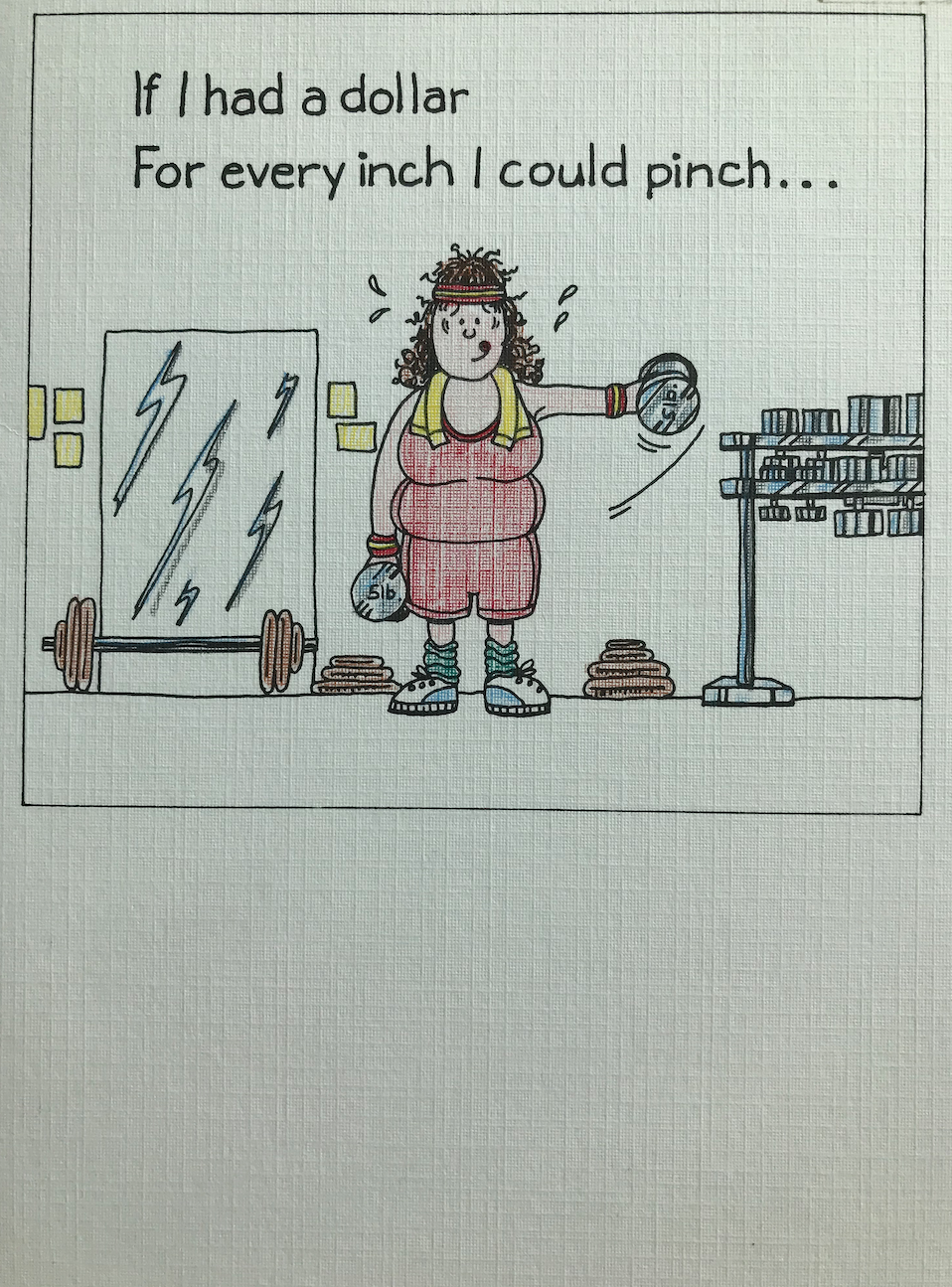
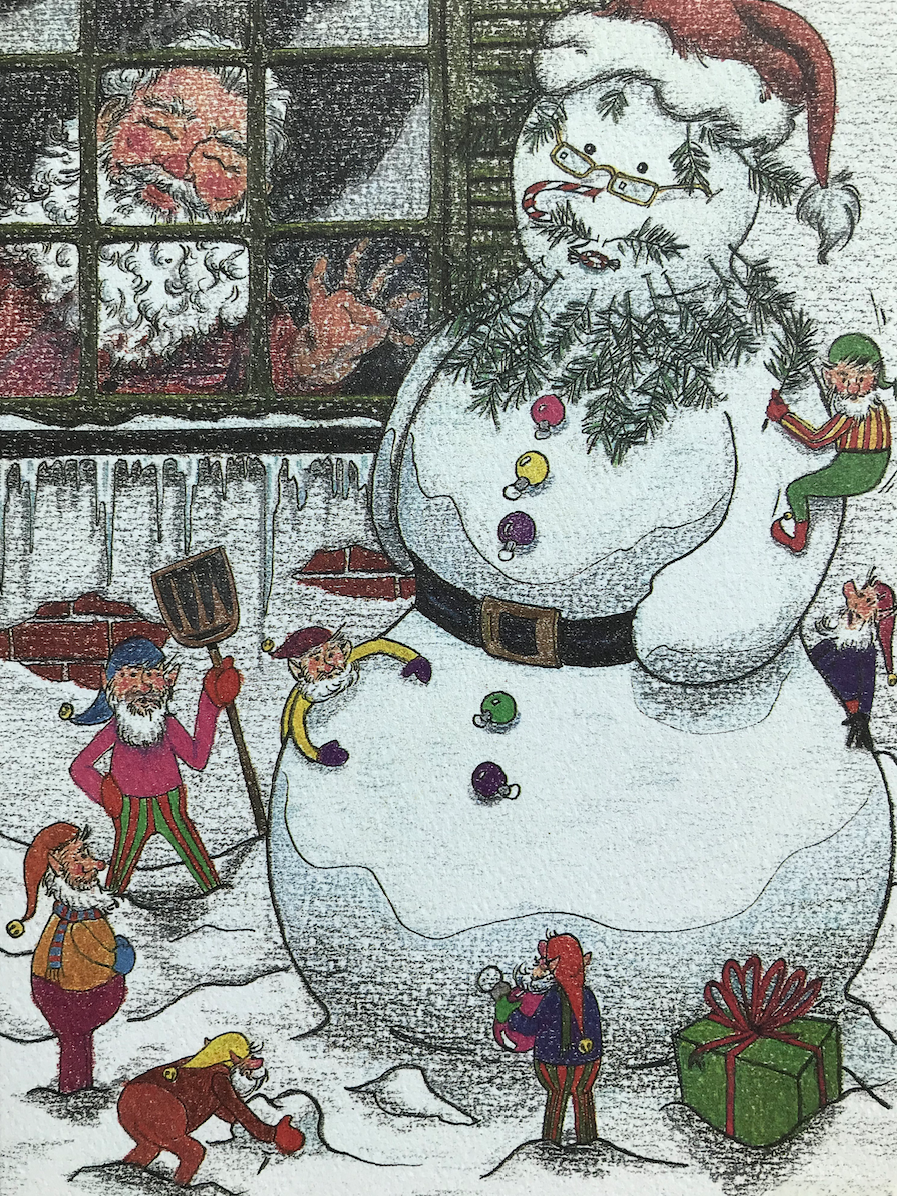
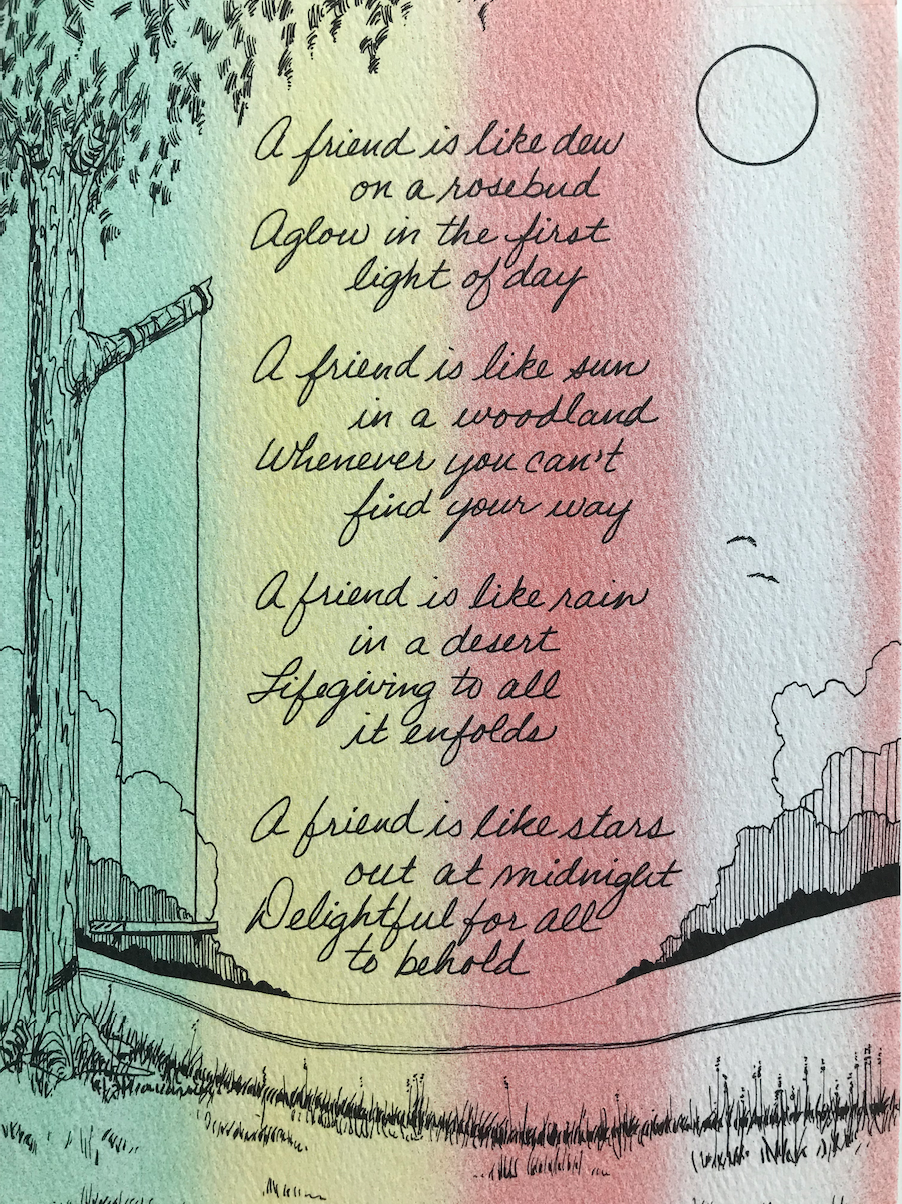
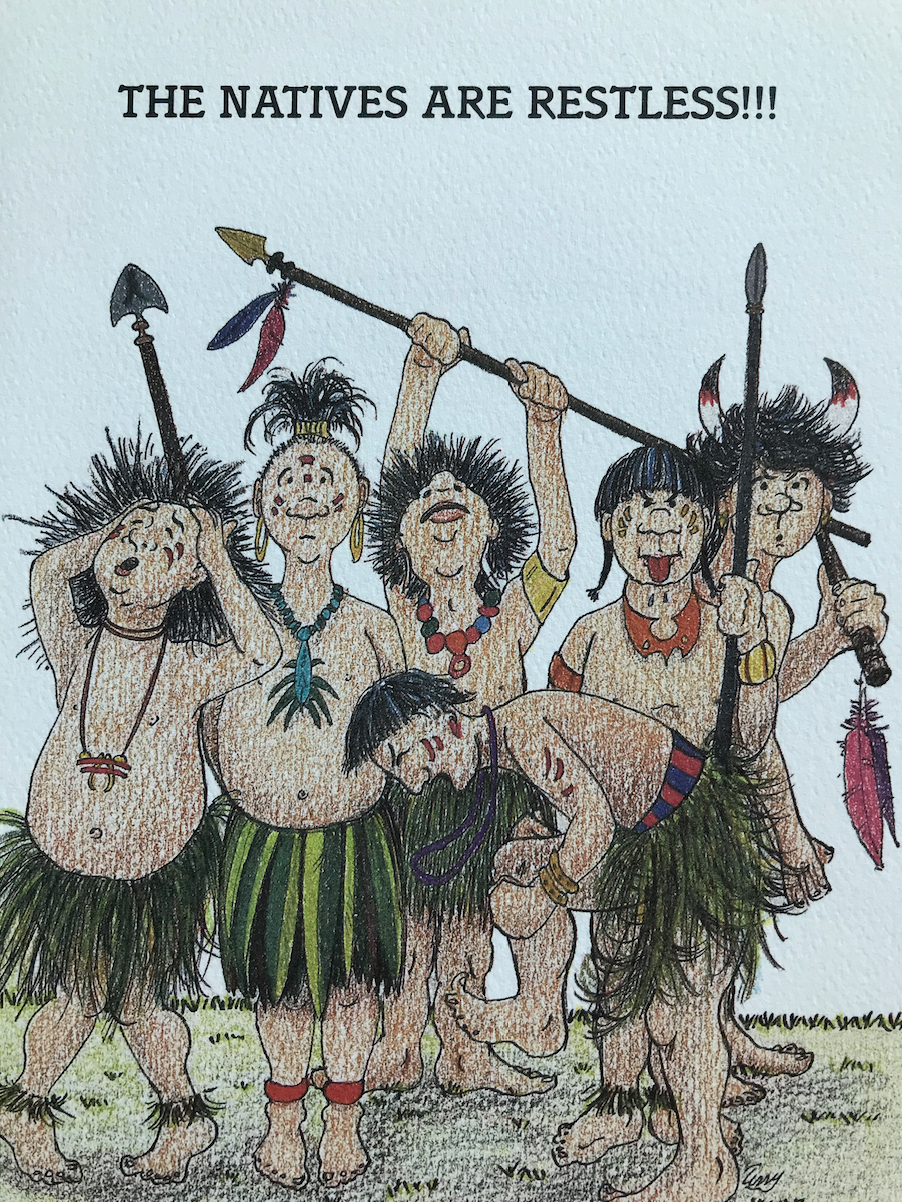
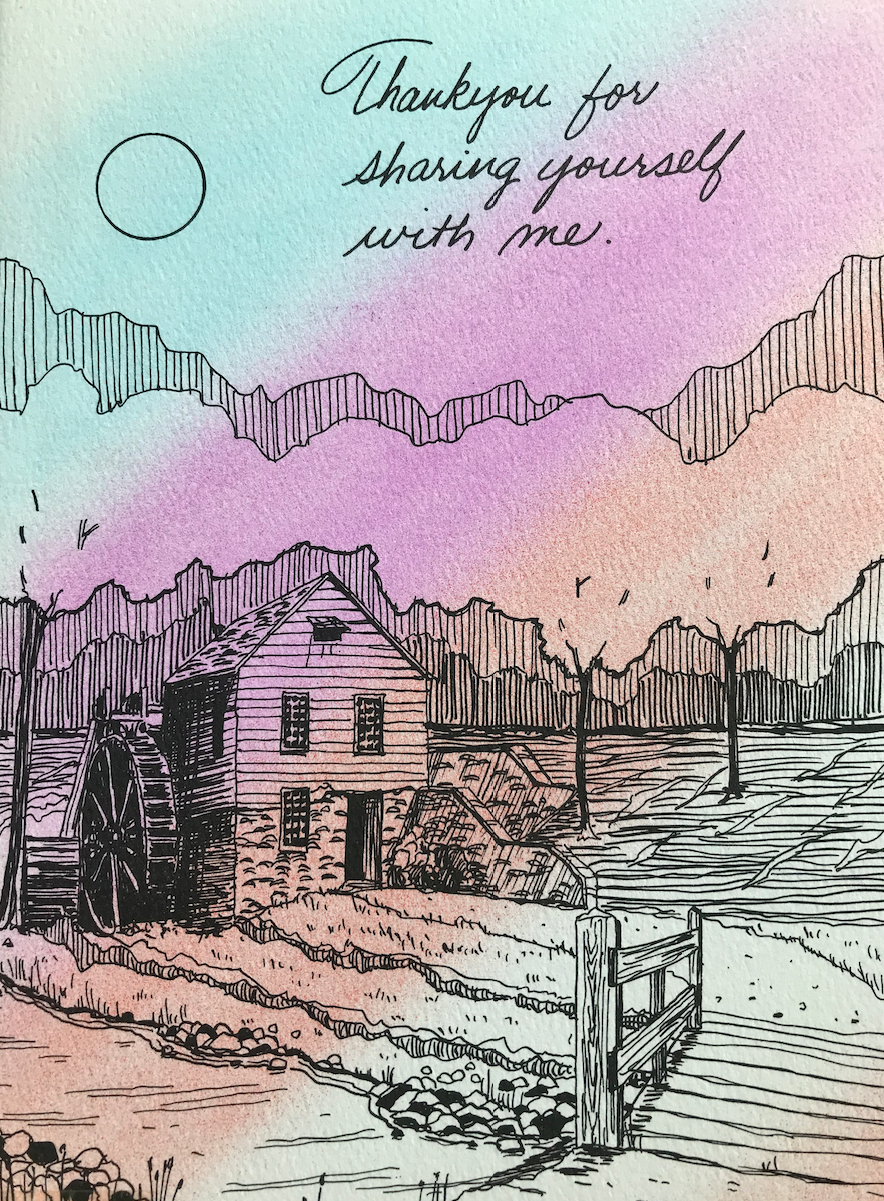
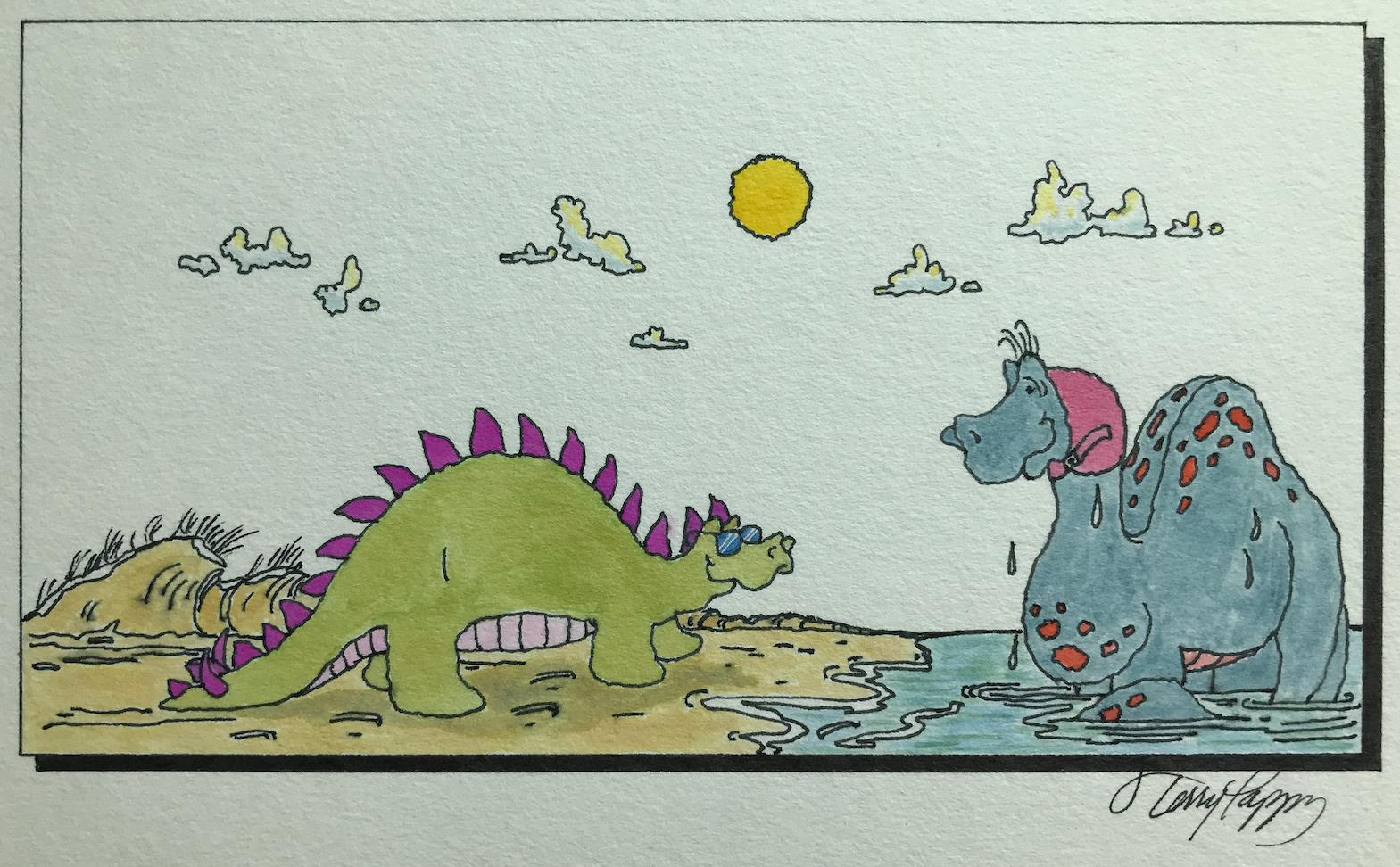
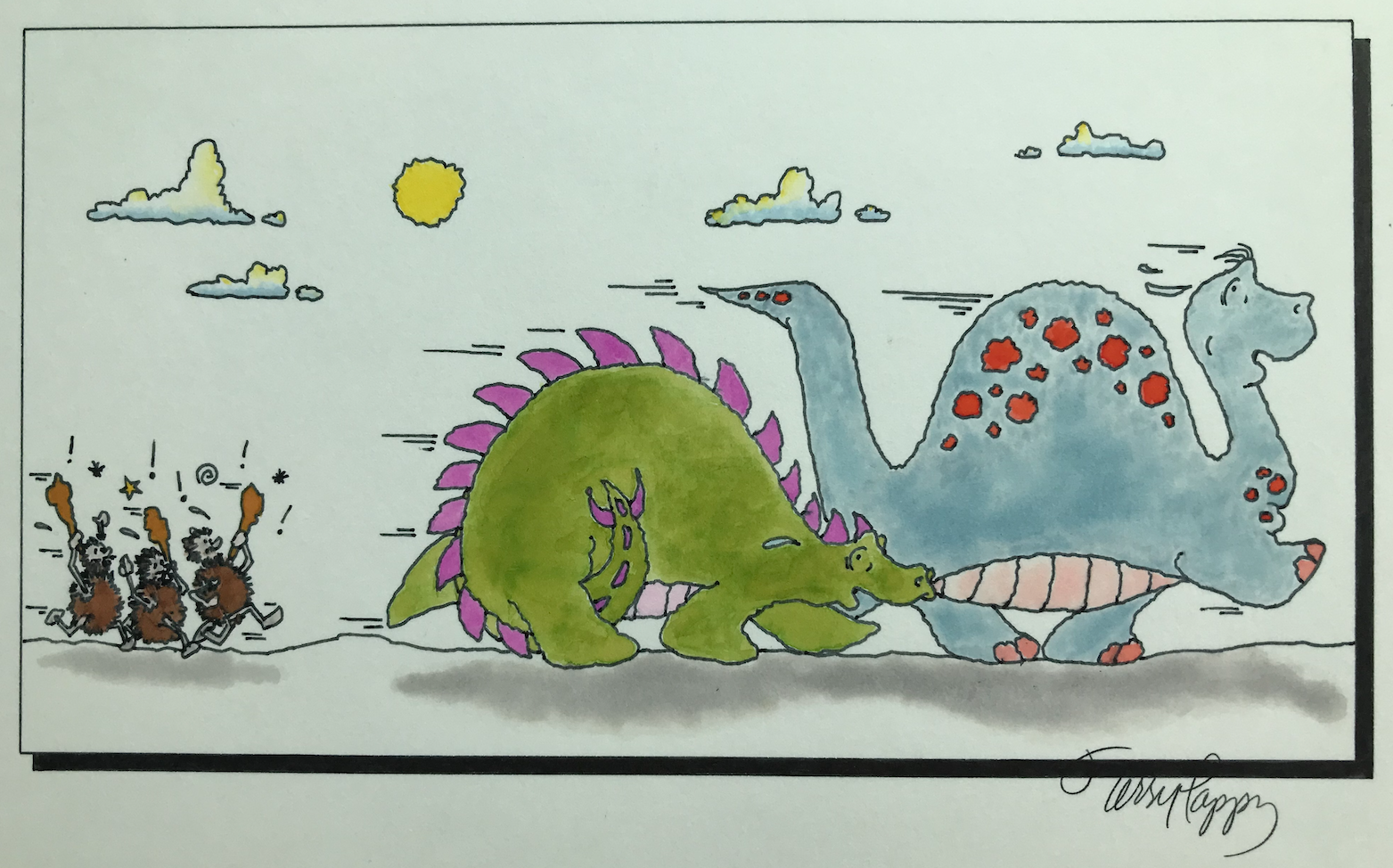
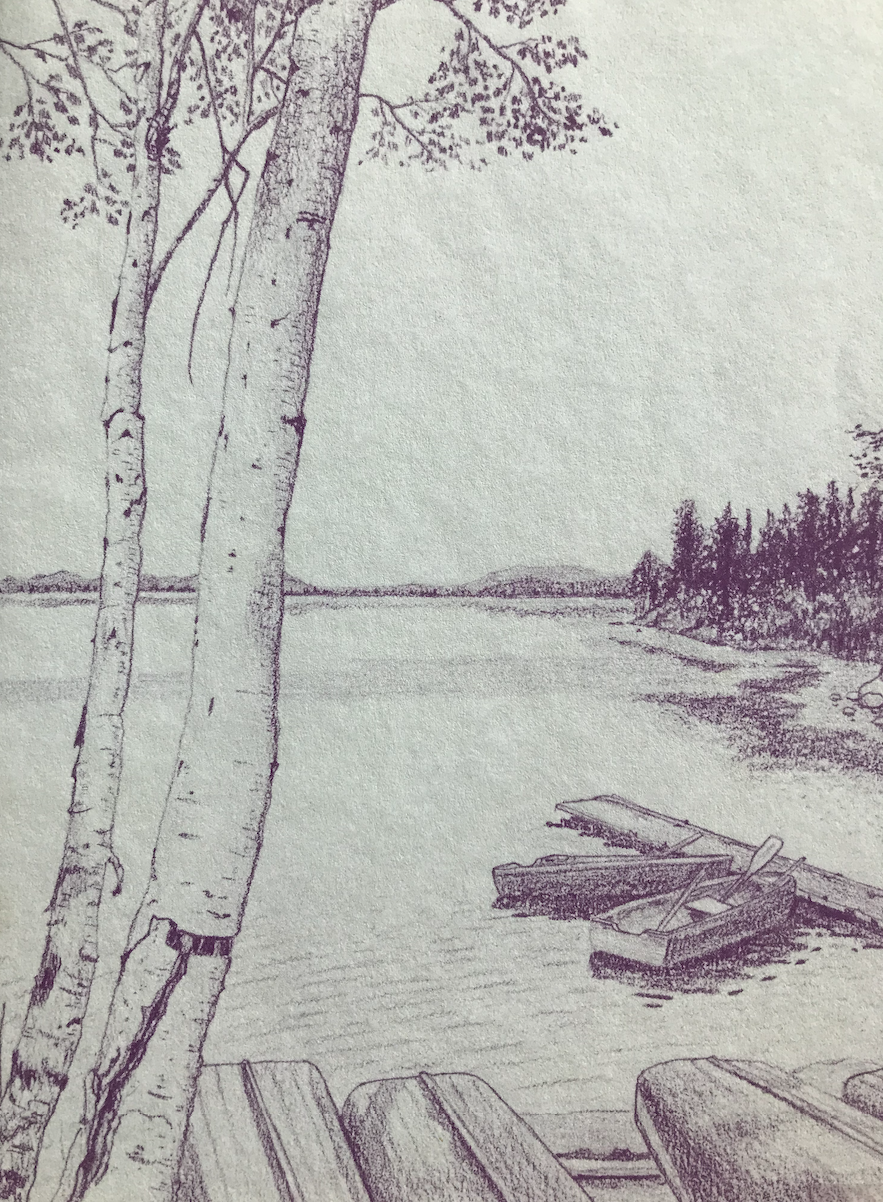
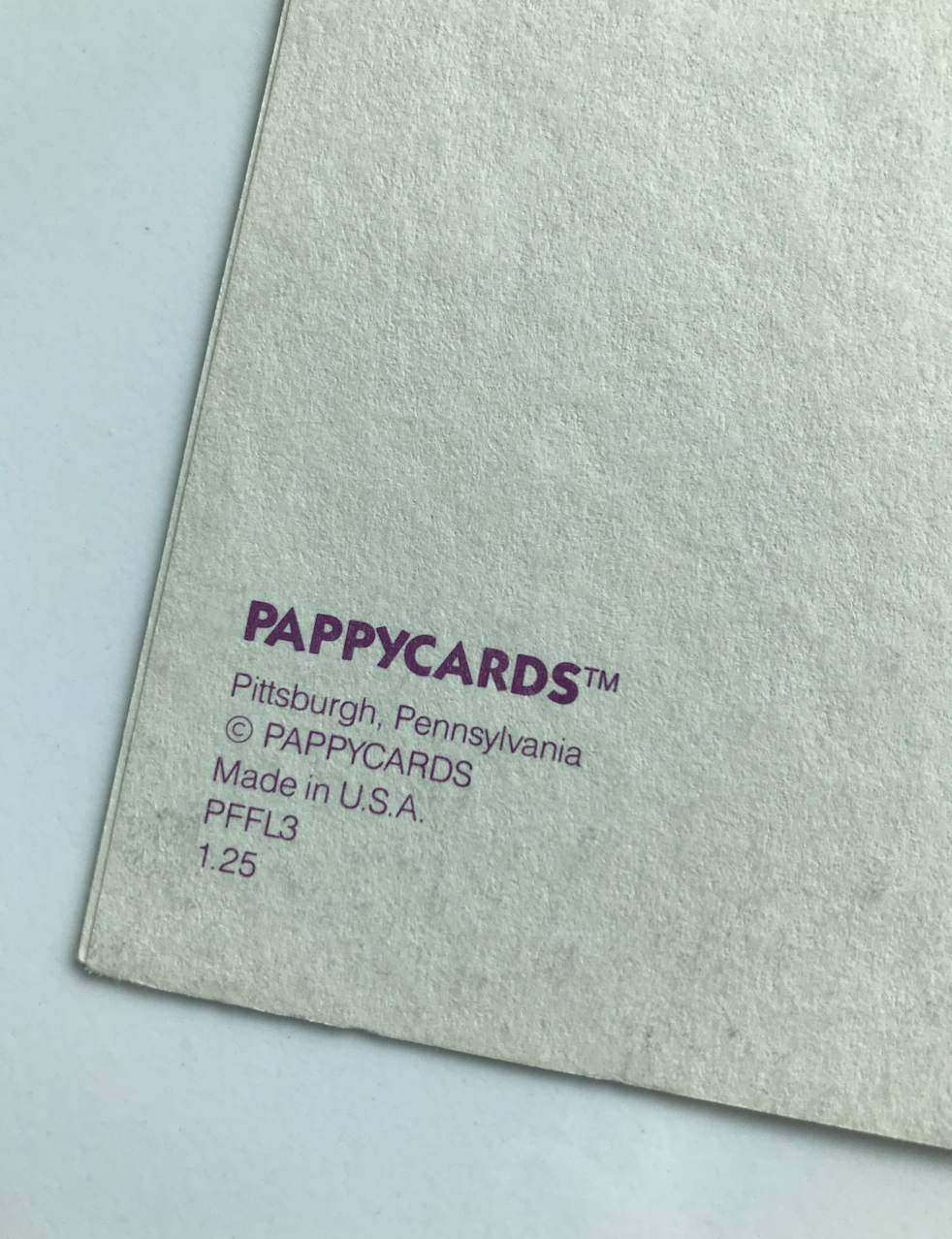
12:05 — I did that for about three and a half years until I got to the point where I just couldn't financially support myself and I had to go back to work. I did all these great different jobs, at printing companies, ad agencies, I was always doing something creative and having a lot of fun. At one point I can remember laying under my very old house in Pittsburgh one January, very, very cold January morning, like 6 a.m. with a hairdryer on an extension cord under the crawl space of my house trying to unfreeze my pipes because I had to take a shower to go to work. It was an old house and I didn't know what I was doing, but it actually worked. I actually got my pipes to unfreeze so I could take a shower. I was laying there going, “Oh my God this sucks. I’ve got to get out of here.” So within like a month I was packed up and totally relocated down to Florida. That's how I ended up in Florida. Those cold Pittsburgh winters just did me in.
13:08 — At that point I actually was in between jobs, which was kind of perfect the way it all worked out. When I started everything down in Florida I got a job working for printing company and then I had multiple jobs after that I worked for a newspaper, I worked for that agency, I worked on the client side and started doing a lot of web work and leading teams through web design and managing the marketing on the website for major brands like Marriott and CNL and things like that and I loved it! I loved the the whole new media side. I loved the speed with which you could actually bring things into reality, where I when I went art school, everything was ‘old school.’ It was work on Letterpress you did everything by hand, it was all cut and paste, you had to lay out stuff by hand and it was a great way to learn all those skills, like a craft. Once the desktop publishing hit the scene and the internet hit the scene it was like, “I’m free! I’m free! This is great, I love it!” because I could make things happen so much quicker.
14:20 — So that's kind of how my journey went up to the point where my last corporate job was working for Marriott Vacation Club which was the timeshare division of Marriott International. I worked there for about six years and it was right around the time of the the market really kind of crashing, and that was around 2006. So they started laying off a lot of the workforce, so I was one of those people that got riffed out of the company. It was a really tough time for me because I had really invested a lot in that career I wanted to stay with the company. Marriott is an amazing company. When I first started working there was when my husband Chuck was very sick with melanoma cancer, and for the entire time that I worked there from like you know 2002-2004 they had to support me while I took care of him as he was going through his cancer treatments and journey so I had to work from home a lot and they were so incredibly accommodating and I had great directors and great people that supported me while I was supporting him. When he passed away in 2004 it was like my life raft I was just like all thank God I've got this job and I've got people around me who really care and flow and within a year-and-a-half I was riffed out of the company. So here I am with a house with two mortgages on it, it was a year-and-a-half after my husband passed away and I get laid off of a job that I never really wanted to leave. I loved my job. I loved working there. It was like a coming to reality kind of experience where I like oh my God am I going to survive this? I thought the worst thing was losing my husband but now I got this on top of it. It ended up being a moment (you know you have those moments in life where it's like you go through the turnstile or you come to a crossroads or whatever the expression is) and you realize. “Oh my God, this is like an opportunity.” I considered going back to school, I was looking for other work but because of what was happening in the economy it was very challenging for me to find something that was comparable to what I had without relocating or doing something more serious.
16:54 — So it hit me one day I'm like, wait a minute. Why don't I hang out my shingle? Why don't I do what I've always wanted to do, which is have my own business? That's how it started. I leveraged a lot of the relationships that I had at Marriott there were a lot of other people that got riffed out along with me, some of them became my first clients. I can remember posting an online classified ad in my community’s newsletter saying, “Hey, if you live in this community, I’m a web designer designer and I’ll design your website for like some really super cheap rate it like a 50% discount or something like that. I mean I was that desperate for any kind of work and so I actually got my very first client that way he was a neighbor and he had a communications company, and he reached out to me and was like, “Hey, Terry let’s work together.” And I thought, great! I’m off and running. And that’s how it started.
18:01 — I was very lucky in my first four or five years that I literally never had to sell, other than that classified ad, I never did advertising, I never did anything I got every bit of a client work through referral. And it's amazing how I’d get a new client and then they would talk to somebody and then these perfect strangers would reach out to me and say, “Hey, I talked to so-and-so, he’s your client, he said you do websites and whatever,” and that’s literally how I got my start. I was so lucky to have so many people do referrals. I'm going to be talking a lot about referrals and building business through referrals in this podcast, so just know that I've been through and talk about baptism by fire I've been through a lot of this stuff and I'm telling you if you can avoid some of the mistakes I've made then I will be doing my job in the Simplify & Multiply show and that's a lot of what I want to put into the show is really helping you sidestep those mistakes I made when I was first getting started. Not that you're first getting started, but if there’s anything I can offer to help you be more successful, to help you stay more sane and more inspired and more keeping that passion high for what it is that you love to do, that's really what I want to offer. I want to give you technical guidance as well as inspirational guidance. It's just so important to have both. You’ve got to have balance in your business as well as in your personal life and having that that guidance—it's not just the how to, like how to advertise on Facebook, or how to layout your website so it works like a sales funnel. I mean all that stuff is great and really helpful I can give you some ideas that really can help move the needle on what you're trying to accomplish in your business, but at the end of the day if your head and your heart are not right, if they're not in the place that you really need them to be in order to be successful for yourself, where you can actually get things out of what you're doing in your business. It shouldn't just be a machine of churn and income and it really needs to be something that is truly satisfying, truly fulfilling, and really something that you jump out of bed in the morning like, I can't wait to take care of this client! I can't wait to go and explore this new opportunity to innovate my product or something like that. Those are some of the things that I want to put into this and I will be putting into this.
20:36 — So, it’s not just about the how, it's about the why, and why we’re doing this and why we’re all in here together as solopreneurs building our businesses and supporting our families and our lifestyle and what we're trying to accomplish in life. Everything in life is like an action journey. We're in action. We’re doing things, we’re moving our hands, we’re typing, we’re traveling, we're presenting, we're building, we're making, we're constantly in this creative action-oriented way of being. But it's also a very spiritual and emotional and mental way of being as well. So I'm going to also be offering a lot of things that are around how to shore up your softer side, how to bring out more empathy, how to really enjoy what you're doing to the point where you don't get as worked up about stuff. See to me, that's about simplifying, so if you simplify how your business operates, you’ll multiply opportunities for inspiration and new ideas and innovation and things like that. That's where the Simplify & Multiply comes in so well.
21:54 — These are some of the things that I want to cover. I'm so excited about the exploding solo economy and I can see so many signs of opportunity for innovation and for new ideas and it’s know it's funny, because I catch myself sometimes—I was watching I can't remember if it was a video or something on TV or sources I can never remember—and I was seeing this young group of entrepreneurs that we're out starting new businesses and doing these exciting things and there was really nothing terribly innovative about what they were selling, like they were selling jeans or they were selling some bottled honey or a make up product or whatever it was, but I had this pang in my throat about, Oh, there's these young people coming on scene and there they’ve got all these fresh ideas and it got so much energy and vitality and I remember when I used to feel that way, because I’m in my fifties now, but yet, I have to stop and say wait a minute—I'm in like the best part of my life right now and things are only getting better—I mean look at me! I’m starting a new podcast! And I’m in my fifties!
23:19 — I think that there are so many awesome people out there that are leaving the corporate life that are maybe done raising their kids and they're like, I’ve always had this interest in X and I would love to maybe start doing that more full-time, or maybe build a business around it. Maybe I could take a thing I make or a thing I love to do and actually create a business around it. That just excites me so much! I think that this solo economy is going to be revolutionary for the whole globe and this is a trend that has been going on for a while and I think that the internet and just access to communications and resources and low barriers of entry are making it so easy for people to start their own business and hang out there shingle and build a brand and make stuff and learn how to do it. We've got so much information and education right at our fingertips that we can figure it out. That's what I mean when I talk about the how and the why because if you are not taking care of the why and the heart and the head, then the how and the mechanics of it, after a while it's going to wear you out. It's totally going to wear you out. That's what I really want to create balance around, is it’s important to have the how, and to go through everything you need to go through to run a business, but it's also really super important to take care of yourself.
Terry Pappy
24:53 — What's ahead for the Simplify & Multiply show, it's going to be a very organic and evolving show. I want you to feel free to engage with me with questions, feedback, challenges you're having in your business and I want to address it right here on the show. Go to SimplifyAndMultiply.com and just fill out the form, this is what I'm dealing with, however you want to share it with me, just send me an email Terry@better3.com. Let me know what you're struggling with what you want me to do research for you and come on the show and actually talk about it, because this is something I am incredibly passionate about and excited about, and I want it to be a good resource. I want it to be inspirational for you. I want it to be helpful for you. I want through engaging with you and the Simplify & Multiply Peer Club Community I really want to improve what I'm doing from my clients in my world as well and learn myself, because I am on a evergreen learning journey and I just love learning, and the best way to learn is with other people
26:05 — My goal is to provide enormous value, entertainment and guidance that will help you fulfill on your solo vision. Anyway, I just wanted to give you that intro episode so you know where I'm coming from you know what I'm about and what this podcast is going to be about and I'm super excited, thank you so much for listening and I look forward to hearing from you what are the things that you want to do to improve your business and make being a solo the best thing that you've ever done in your life.
